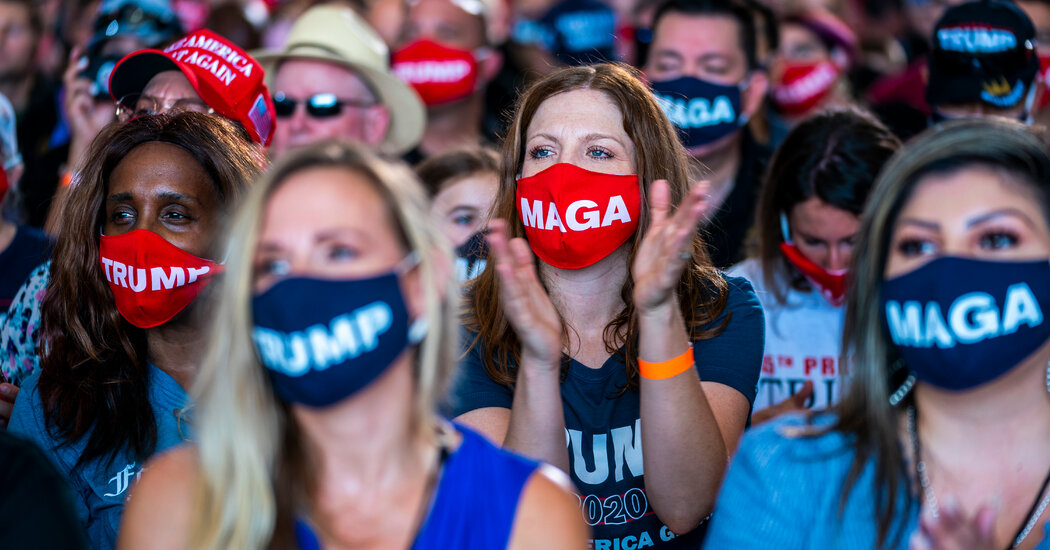To be sure, Facebook is not the only medium where right-wing content thrives. Millions of Americans still get their news from cable news and talk radio, where conservative voices have dominated for years. Many pro-Trump Facebook influencers also have sizable presences on Twitter, YouTube and other social networks.
But the right’s dominance on Facebook, specifically, is something to behold. Here are just a few data points I pulled from CrowdTangle this week:
-
The conservative commentator Ben Shapiro has gotten 56 million total interactions on his Facebook page in the last 30 days. That’s more than the main pages of ABC News, NBC News, The New York Times, The Washington Post and NPR combined. (Data from a different firm, NewsWhip, showed that Mr. Shapiro’s news outlet, The Daily Wire, was the No. 1 publisher on Facebook in July.)
-
Facebook posts by Breitbart, the far-right news outlet, have been shared four million times in the past 30 days, roughly three times as many as posts from the official pages of every Democratic member of the U.S. Senate combined.
-
The most-shared Facebook post containing the term “Black Lives Matter” over the past six months is a June video by the right-wing commentators The Hodgetwins, which calls the racial justice movement a “damn lie.” The second most-shared Black Lives Matter post? A different viral video from The Hodgetwins, this one calling the movement a “leftist lie.” (The Hodgetwins also have the 4th, 6th, and 12th most shared posts.)
-
Terrence K. Williams, a conservative comedian and Trump supporter, has averaged 86,500 interactions per Facebook post in August, more than twice as many as Joe Biden, the Democratic presidential nominee, who has averaged 39,000 interactions per post. (Mr. Trump outdoes them both, naturally, with an average of 92,000 interactions per post.)
A few caveats, before my Democratic readers jump off the nearest pier.
These figures include only posts on public pages, in public groups, and by verified accounts, and they don’t include Facebook ads, where the Biden campaign has been outspending the Trump campaign in recent weeks. Counting Facebook interactions doesn’t tell you how someone felt about a post, so it’s possible some conservative posts are being hate-shared by liberals. And Facebook has argued that engagement isn’t the same thing as popularity.
“These points look mostly at how people engage with content, which should not be confused with how many people actually see it on Facebook,” Joe Osborne, a Facebook spokesman, said in a statement. Mr. Osborne added that “when you look at the content that gets the most reach across Facebook, it’s not at all as partisan as this reporting suggests.” (Facebook does not disclose this type of data publicly, except once in a while in response to my tweets.)
Democrats aren’t totally absent from Facebook’s upper echelon. Ridin’ With Biden, a pro-Biden page started in April by the founders of the liberal Facebook page Occupy Democrats, has quadrupled its following over the past three months, and routinely gets more engagement than Breitbart and other right-wing heavy-hitters. Individual posts by Bernie Sanders, Barack Obama and other prominent Democrats have broken through in recent weeks.
And political campaigners have pointed out, correctly, that being popular on the internet isn’t a guarantee of electoral success. (“Retweets don’t vote,” as an experienced Democratic operative once told me.) In addition, Facebook’s older, more conservative user base may not reflect what’s happening on platforms like Instagram and TikTok, which draw a younger crowd.
Still, the platform’s sheer scale makes it vital to understand. As of 2019, 70 percent of American adults used Facebook, and 43 percent of Americans got news on the platform, according to the Pew Research Center. (Those numbers may have increased because of the pandemic.) We know that the company’s product decisions can make or break political movements, move fringe ideas into the mainstream, or amplify partisan polarization. Registering four million voters before the November election, as Facebook has said it would do, could be a decisive force all on its own. (Typically, higher turnout benefits Democrats, but given what we know about the media diets of hyperactive Facebook users, who knows?)
[ad_2]
Source link



